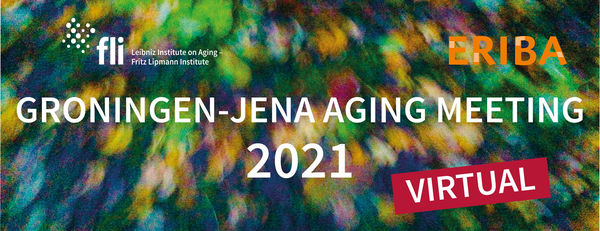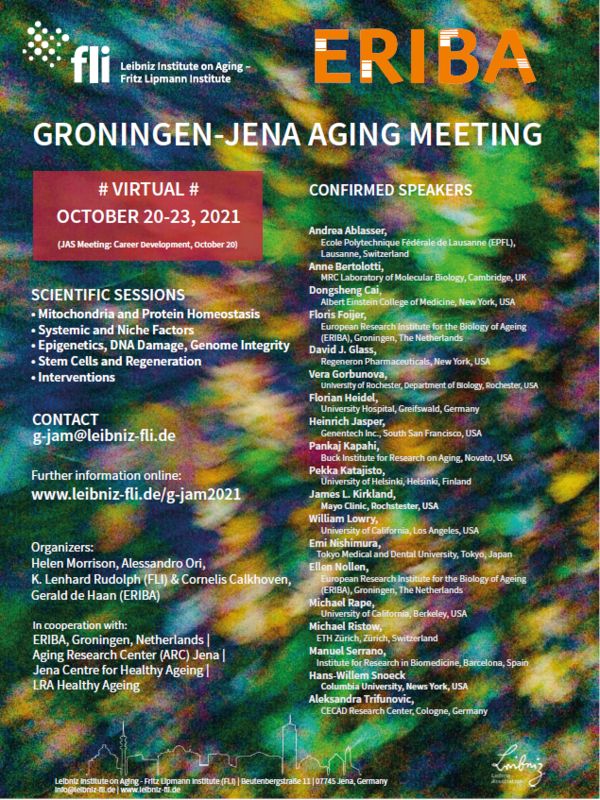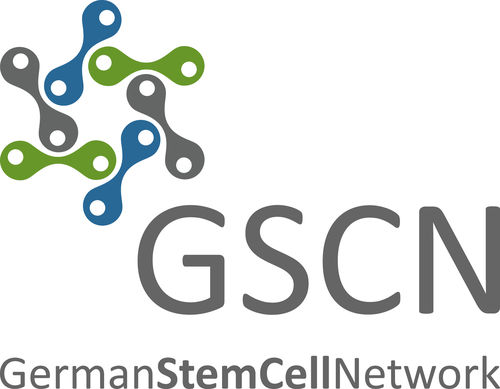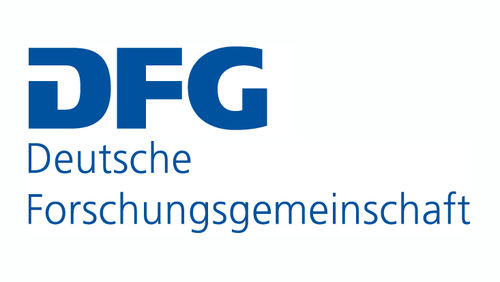
We are excited to announce that JAM 2020 has been rescheduled as a VIRTUAL meeting that will take place from October 20-23, 2021.
This year, we have joined forces with friends and colleagues from the European Research Institute for the Biology of Ageing , Groningen, Netherlands - to set up a world-class meeting for you.
With already 20 confirmed, renowned international speakers - we are convinced that the Groningen-Jena Aging Meeting (G-JAM 2021) will be THE ageing meeting in 2021.
At the moment we plan G-JAM as an online meeting, but we leave the options open to change into a hybrid meeting should the COVID situation allow.
Description
Aging is a major risk factor for the development of organ dysfunction and disease. Although under debate, there exists a strong association between decline in stem cell function, possibly impinging on the selection of mutant stem cells, impairments in tissue maintenance and disease development during aging. The G-JAM will discuss basic concepts and therapeutic targets on the causes and consequences of stem cell during organism aging.
Principal themes and objectives of the meeting
The G-JAM fosters interaction of researchers engaged in the study of basic principles of stem cell and tissue maintenance in aging. The meeting will focus on basic molecular and genetic processes that affect genetic and epigenetic stability, protein homeostasis and metabolic processes - thereby impairing the functionality and self-renewal of stem cells and organ maintenance.
The main aim of the G-JAM is to increase our understanding of organism aging.
- Career Development Event (October 20th) -
Scientific Sessions
- Mitochondria and Protein Homeostasis
- Systemic and Niche Factors
- Epigenetics, DNA Damage, Genome Integrity
- Stem Cells and Regeneration
- Interventions
Keynotes:
Andrew Dillin
HHMI and University of California, Berkeley, USA
His lab focuses on why an aging organism loses control over the integrity of its proteome with the aim to uncover new therapeutic strategies for the treatment of age-related pathologies. He discovered secreted proteins from mitochondria that can drive tissue aging.
Vera Gorbunova
University of Rochester, Department of Biology, Rochester, USA
Her lab focuses on DNA damage and the role of Sirtuin signaling in Aging. She recently started to employ research work on long-lived rodents and cross species gene replacements to identify longevity mechanisms in mammals.
Manuel Serrano (Keynote)
Institute for Research in Biomedicine, Barcelona, Spain
He discovered oncogene induced senescence. His lab focuses on the role of epigenetic reprogramming in tissue regeneration and on the development of strategies for the elimination of senescent cells in order to prevent cancer growth and tissue destruction.
Speakers:
Andrea Ablasser
Ecole Polytechnique Fédérale de Lausanne (EPFL), Lausanne, Switzerland
Her lab focuses on the innate immune system and has contributed fundamental discoveries in elucidating the mechanisms of immunorecognition of DNA by the cGAS-signaling pathway.
Anne Bertolotti
MRC Laboratory of Molecular Biology, Cambridge, UK
Her lab focuses on mechanisms that govern the deposition of misfolding-prone proteins and their accumulation in aged cells with the aim to identify strategies that could reduce the burden of misfolded proteins for cells and organisms.
Dongsheng Cai
Albert Einstein College of Medicine, New York, USA
His lab is focused on understanding the role of central nervous system in the development and intervention of metabolic syndrome, aging and related diseases. The ultimate aim is to develop effective molecular and cell therapies to break the pathogenic connections, leading to the prevention and treatment of metabolic and aging-related diseases.
Floris Foijer
European Research Institute for the Biology of Ageing (ERIBA), Groningen, The Netherlands
His lab wants to understand how the process of chromosomal instability leads to cancer and tumour cell evolution.
David J. Glass
Regeneron Pharmaceuticals, New York, USA
He provided ground breaking work on the role of metabolic pathways in driving the functional decline of muscle stem cells during aging.
Florian Heidel
University Hospital, Greifswald, Germany
He works on hematopoietic stem cell aging, especially on the question how this leads to the selection of aberrant stem cell clones and leukemia formation.
Heinrich Jasper
Genentech Inc., South San Francisco, USA
His lab focuses on stress and inflammatory pathways that impair tissue homeostasis during aging. He has contributed fundamental discoveries on how age-related dysfunction of somatic stem cells perturbs regeneration in barrier epithelia of the fly intestine.
Pankaj Kapahi
Buck Institute for Research on Aging, Novato, USA
He investigates how organisms respond to nutrient status and how this influences health and disease. His lab uses different model organisms to investigate how various physiological and molecular processes, including fat metabolism, circadian clocks, advanced glycation end products, calcification, and intestinal permeability, are influenced by nutrients to impact organismal health and survival.
Pekka Katajisto
University of Helsinki, Helsinki, Finland
His lab studies how stem cell intrinsic and extrinsic mechanisms alter tissue renewal capacity in aging with particular focuses on the intestinal stem cells niche and the interplay between cellular metabolism and stem cell fate.
James L. Kirkland
Mayo Clinic, Rochester, USA
James is Professor and Consultant, Division of General Internal Medicine, Department of Internal Medicine at Mayo Clinic. His lab focuses on the impact of cellular aging (senescence) on age-related dysfunction and chronic diseases, with the aim of developing methods for removing these cells and alleviating their effects.
William Lowry
University of California, Los Angeles, USA
He investigates metabolic control of skin stem cells and how these circuits can affect hair growth and skin stem cell maintenance and function during aging.
Ellen Nollen
European Research Institute for the Biology of Ageing (ERIBA), Groningen, The Netherlands
Her lab aims to uncover the cellular pathways that regulate disease-protein toxicity, aggregation, and spreading. The accumulation of aggregation-prone disease proteins in aggregates in the brain is the major pathological hallmark of several age-related neurodegenerative disorders, including Alzheimer’s and Parkinson’s disease.
Michael Rape
University of California, Berkeley, USA
His lab aspires to discover, and mechanistically understand, signaling pathways that guide human cell fate decisions. The starting point is the role of ubiquitin-dependent modifications in development, and branched to the dissection and the consequences of protein misfolding and aggregation and finding therapeutic entry points for the treatment of neurodegenerative diseases.
Michael Ristow
ETH Zürich, Zürich, Switzerland
Michael Ristow has provided ground breaking work on the role of oxidative stress in triggering hormesis response that elongate organismal survival in C. elegans.
Hans-Willem Snoeck
Columbia University, New York, USA
His work provides experimental evidence for a novelrole of mitochondria in regulating Calcium homeostasis in hematopoietic stem cells.
Aleksandra Trifunovic
CECAD Research Center, Cologne, Germany
Her lab studies the role of mitochondria in the determination of longevity with a particular focus on the impact of accumulation of mutations in mitochondrial DNA.
Björn von Eyss
Leibniz Institute on Aging, Jena, Germany
His lab focuses on the role of the Hippo pathway in aging, regeneration, and cancer, with the goal of promoting healthy aging and developing new cancer therapies through modulation of this pathway.
Julia von Maltzahn
Leibniz Institute on Aging, Jena, Germany
Her lab focuses on muscle stem cells and regeneration of skeletal muscle in age and disease.
G-JAM is organized by Leibniz Institute on Aging – Fritz Lipmann Institute (FLI) & ERIBA Groningen, Netherlands.
In cooperation with:
Aging Research Center (ARC) Jena | Jena Centre for Healthy Ageing | LRA Healthy Ageing
- Registration closes on October 15: 100 € (plus possible bank fees)
Included in the registration fee are free access to all talks, a chance to be selected for a short talk, poster presentation, and virtual get together.
Payment information will be sent separately.























